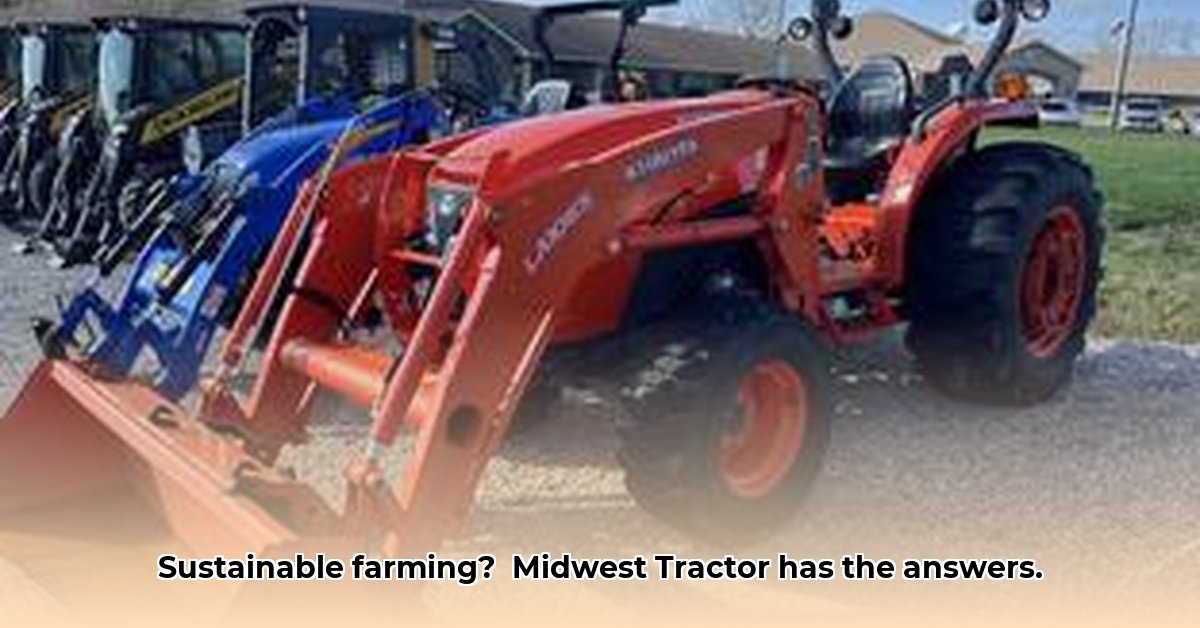
Midwest Tractor Sales (MTS) in Breese, Illinois, holds a strong local reputation. However, the agricultural landscape is rapidly shifting towards sustainable practices, demanding a proactive response from equipment dealerships. To maintain competitiveness and capitalize on emerging opportunities, MTS must embrace sustainable agriculture, not merely as a trend, but as a core business strategy. This article outlines a practical plan for MTS to leverage this transition for significant growth and solidify its position as a leader in sustainable agricultural solutions. For more information on sustainable farming solutions, check out this resource on liquid fertilizer.
A Roadmap for Sustainable Success at Midwest Tractor Sales
The current market presents both challenges and significant opportunities for MTS. Simply maintaining the status quo is insufficient. A strategic shift towards sustainable agriculture is critical for long-term viability and growth. The following actionable steps provide a clear pathway towards achieving that goal:
1. Develop a Comprehensive Sustainability Strategy: This isn't about superficial "greenwashing." MTS must conduct a thorough assessment of its current inventory, identify environmentally friendly farming methods to support, and strategically invest in equipment and technologies aligned with sustainable practices. This requires a long-term, evolving commitment. A data-driven approach, including a SWOT analysis, should inform all decisions.
2. Invest in Sales Team Training: The sales team is the direct link to customers. Comprehensive training on sustainable agricultural technologies—precision farming, organic techniques, eco-friendly machinery—is crucial for building trust and establishing MTS as a knowledgeable partner. Consider incorporating role-playing and real-world case studies in the training program. How can we ensure 95% of sales staff demonstrate proficiency in sustainable agriculture techniques within six months?
3. Modernize the Online Presence: MTS needs a dynamic, informative website showcasing its commitment to sustainability. This includes detailed information on sustainable farming equipment, compelling case studies of successful partnerships with local farmers, and easily accessible resources. The goal is to make it simple for customers to understand the benefits of sustainable farming equipment and MTS's role in providing it. Will implementing a user-friendly website with updated content increase lead generation by 20% within the next quarter?
4. Transform into a Community Resource: Go beyond simply selling tractors. Host workshops, provide educational materials on sustainable farming methods, and build strong relationships with local farmers. This transformative approach strengthens community ties and establishes MTS as a valuable resource for the region. How can we increase community engagement through educational initiatives, potentially attracting a 15% increase in new customers?
5. Forge Strategic Partnerships: Collaborate with companies specializing in precision farming technology and organizations focused on sustainable agriculture. This enhances MTS's offerings, opens up joint marketing opportunities, and reinforces its position as a leader in sustainable agricultural solutions. What are the potential ROI metrics for key partnerships within the next year?
6. Explore Funding Opportunities: Numerous government grants and incentives exist to support businesses promoting sustainable agriculture. Actively researching and applying for these opportunities can help finance innovative projects and accelerate growth. How can we identify and secure at least three funding opportunities within the next fiscal year?
Addressing Potential Challenges and Risks
While the opportunities are substantial, MTS faces potential risks which require proactive mitigation:
| Risk Factor | Mitigation Strategy |
|---|---|
| Limited online presence/data transparency | Develop a robust digital marketing strategy; enhance website content; increase data transparency (while respecting privacy and legal requirements). |
| Slow adoption of sustainable practices | Offer comprehensive staff training; demonstrate clear ROI to customers; incentivize early adoption with special programs. |
| Competition from larger dealerships | Focus on niche markets; cultivate strong, personalized relationships with local farmers; highlight specialized expertise and local support. |
| Changes in government regulations | Stay informed on regulatory developments; adapt proactively; collaborate with industry associations. |
Conclusion: Embracing the Future of Agriculture
The future of agriculture is sustainable. Midwest Tractor Sales has the foundation to thrive. By implementing the strategies outlined above, MTS can not only maintain its market position but become a leader in the evolving landscape of sustainable agriculture. This involves more than just selling equipment; it's about creating partnerships, offering expertise, and contributing to a more sustainable and prosperous future for the agricultural community.